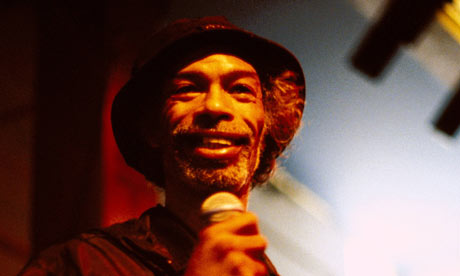Since news of Gil Scott-Heron‘s passing made the rounds this past Friday, I’ve tried to kick around a few ideas, but couldn’t really find a way to talk about what exactly he and his work mean to me. In spite of that, here’s something anyway.
Because of my age, I obviously was exposed to him well past his ’70s and early ’80s heyday. This exposure came mostly through the samples of his work that ran like a thread through hip hop, affixing those songs with an instant urgency. And, of course, “The Revolution Will Not Be Televised” had more than left its mark on the American consciousness. The title of the poem/song had lost some of its significance by the time I was coming of age, becoming somewhat of a catchphrase bandied about with no real significance. Still, I felt like there was something there calling to me.
However, it wasn’t until the late nineties and early aughts, when I was first delving into spoken word, that I really became aware of him. This was around the time that I was obsessed with knowing any- and everything about the music to which I listened. As soon as I bought a CD, I would listen to it while reading its accompanying liner notes, paying special attention when a song mentioned a particular sample. Mos Def‘s Black on Both Sides had a song called “Mr. Nigga” which had one of the funkiest, jazziest samples I’d ever heard. Imagine my surprise when I learned that the sample was a GSH song called “Legend in His Own Mind.” My mind was blown. I’d only associated him with poetry at this point, not knowing that he had done straight ahead music. From there, the digging began. I found 1980 and Real Eyes and Pieces of a Man and Winter In America and songs like “We Almost Lost Detroit,” “Billy Green Is Dead,” and “Home Is Where the Hatred Is.” In fact, I’m still in the process of procuring his back catalog.
Now that he’s gone, hopefully a new generation will discover his work and it’s meaning. Though he suffered from his own personal demons, he was far too great a man and artist to simply be known as a sample. Last year he released I’m New Here and it seemed, at the age of 61, he was on the verge of a great career resurgence with a new yet still uncompromising sound. It’s too bad that now we don’t get to see exactly where that new sound could’ve went.
Like Langston, GSH was one of my writing heroes. His honesty, not only in his songs and poetry (he’d also published two novels), is what I strive for when I put words on a page. He was unafraid to expose his soul through his words so that the world could not only see him but also see his life and the lives of his people and the circumstances surrounding them all. Through all his faults, I can only hope to have the courage and conviction in my work that he had in his.
Thanks for your life and your inspiration Brother Gil.
D
